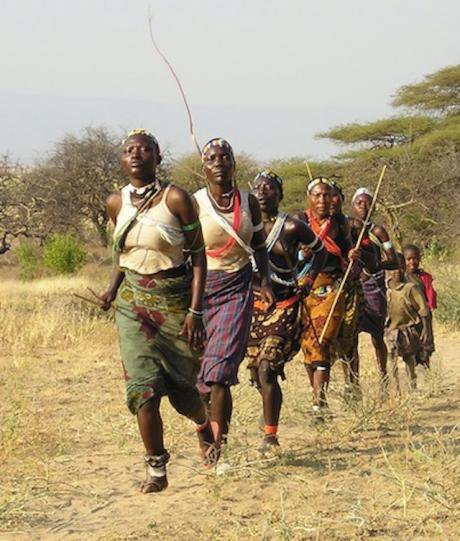
研究表明,仍然过着祖先狩猎/采集生活方式的人类并没有经历发达国家中与生殖功能障碍或更年期相关的大量痛苦,这很可能是由于相对健康的新陈代谢。在考虑什么能在任何年龄或阶段支持我们的荷尔蒙、微生物群和新陈代谢时,我们不妨考虑一下我们饮食和生活方式的差异。因此,虽然我们可能不想 "把孩子和洗澡水一起倒掉",回到没有那么多奇妙的科技进步的生活,但我们仍然可以从我们人类和类人猿祖先的生活方式中寻找线索,了解如何预防一些在现代人类中日益增多的退化性疾病。这是一个大问题,请抓紧时间,让游戏开始吧!
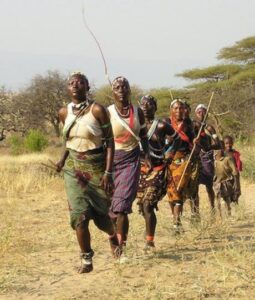
祖先生活的人类
地球上还留存着一些传统人类,他们的生活和饮食习惯已经延续了数千年。虽然他们无法获得我们现代先进的医疗保健服务,但他们几乎没有退行性疾病,也不需要长期服用药物。研究表明,他们拥有多样、健康的微生物群和功能良好的生殖系统。他们似乎是通过以下方式做到这一点的
- 摄入营养丰富的饮食,以动物性食物为主
- 体验与地球和彼此的深层联系
- 拥有支持性的社会和家庭网络
- 几乎不接触电磁场、永久/有毒化学物质或空气污染
- 终生保持活跃,总体压力较小
- 每天接受来自太阳的自然光照射(夜间有火光照射)
- 经常暴露在寒冷或炎热的环境中
科学研究表明,这些生活方式有助于调节人体的昼夜节律、健康的新陈代谢、平衡的荷尔蒙和生殖功能、良好的睡眠、氧化还原潜能、压力管理以及天然的高 "感觉良好 "荷尔蒙。
第 2 部分 - 运动、散热、电磁场和污染以及压力
运动
我们可以说,在任何年龄段,每天进行某种类型的锻炼都是必不可少的。事实上,全天坚持活动比整天坐着然后去健身房锻炼一个小时更有效。研究表明,有规律的活动和一些强度较高的运动有助于减少生殖和荷尔蒙问题,例如更年期表现,如体温波动和情绪不稳定,以及微生物组和荷尔蒙平衡。肌肉现在被视为长寿器官,与新陈代谢、心脏和骨骼健康有关。此外,运动还能帮助镇静神经递质。更年期后的三个生理变化是骨骼肌和骨密度下降,脂肪组织增加,尤其是不健康的内脏脂肪。有一种皮下脂肪,即皮下第一层脂肪,代谢健康。这种浅层皮下脂肪代谢活跃,能分泌有益的荷尔蒙。较深的皮下脂肪通常代谢不健康,而内脏脂肪,尤其是长在器官内部的内脏脂肪,则非常不健康。
传统人类持续保持活跃,增加并保持大量的瘦肌肉。因此,即使他们有皮下脂肪组织,其中的一部分或大部分也会是健康的表皮脂肪、棕色脂肪/米色脂肪,因此他们的新陈代谢依然健康--这已被证明比肌肉不发达而身体几乎没有脂肪更健康。女性的预防策略是注重锻炼和保持肌肉力量。实现这一目标的方法多种多样。开始训练的年龄越小越好;不过,任何年龄段都可以开始阻力训练等,并从中获益。研究表明,阻力训练(举重)和跳跃是绝经后骨骼健康的关键。
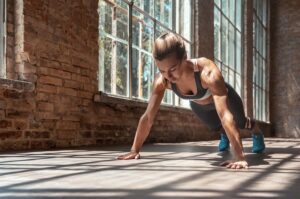
另一个重点可能是能降低皮质醇和其他压力荷尔蒙的运动。只需步行 20-30 分钟,就足以大幅降低皮质醇水平。传统的人类倾向于大量步行。平均每天步行 10,000-12,000 步与健康的体重和心血管功能有关。普拉提、温和的瑜伽、气功、太极或其他温和的运动对缓解压力也很有帮助。高强度间歇训练(HIIT)已被证明对心脏和大脑的健康老化有强大的支持作用,有针对性的有氧运动有助于脑细胞、心脏组织和肺功能(最大容氧量)的修复和生长。对于有能力的人来说,短跑也有好处,尤其是在减少内脏脂肪方面。运动疗法包括大量步行、适龄的有氧运动和力量训练,再加上平衡和瑜伽类运动,也许就能达到目的。如果合适的话,还可以加入一些 HIIT 训练。在户外锻炼时,可以赤脚踩在草地或沙地上,或在海里/湖里/河里游泳,这样既能享受自然光,又能脚踏实地。"森林浴"--在灌木丛或森林中生活或散步,已被证明有助于健康的压力和生殖激素水平。
集中智慧:
- 青少年和青春期:任何他们喜欢的活动!不是每个人都是超级运动健将,但我们都能找到自己喜欢的 "游戏 "或运动方式。
- 生育年龄:通过运动增强力量、灵活性、瘦肌肉和平衡荷尔蒙。对于与年龄有关的心血管僵化,HIIT 程序已被证明对心脏和血管有支持作用。
- 生育:更注重缓解压力的运动,但如果身体健康,则与正常的日常活动相当类似。
- 怀孕:研究表明,保持运动的孕妇在怀孕和分娩时遇到的问题较少。当然,要避免接触性运动、粗暴或紧张的活动!
- 更年期关注 安全地 保持或增强肌肉质量,以提高骨密度和力量。参加快乐的游戏活动,有助于缓解压力。饭后短途散步有助于保持健康的体重。不要惧怕高强度、短时间的运动和负重训练,因为这些运动和训练的益处已经得到了充分的研究,但如果年龄较大,请在监护下进行。
热能实践
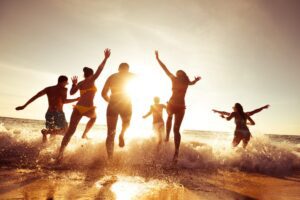
传统人类相对经常地暴露在极热和极冷的环境中。我们进化出了 "休克 "蛋白质,这种蛋白质会在极热或极冷的压力下释放出来,引发一系列最终有益的过程。这就是所谓的荷尔蒙压力,或者说 "杀不死你的东西会让你变得更强大"。越来越多的研究发现,暴露在寒冷或炎热环境中与更健康的生殖功能和更顺利的更年期之间存在联系。研究告诉我们,每周分别在冷水中浸泡 3 次,每次 11 分钟;每周分别蒸 3 次桑拿,每次 60 分钟,就足以看到新陈代谢和脂肪组成方面的益处。
在潮热的时候蒸桑拿似乎有悖常理,但多项研究表明,在围绝经期蒸桑拿是有益的。研究表明,干桑拿和/或红外线桑拿能帮助更年期妇女调节体内温度和汗液,促进睡眠,使心血管和关节舒适,提高性欲,减轻体重,缓解压力,平衡情绪。一般认为,桑拿的温度高于 75°C(约 170°F)。红外线照射是有益的,您只需将有益的红外线照射与非常热的桑拿浴分开(除非您的红外线灯能承受高温!)。

在冷的方面,新的证据表明,定期进行冷水浴或冷冻疗法可能对荷尔蒙和生殖功能、压力和情绪管理、关节舒适度、血液循环和压力、增加健康的 "米色 "脂肪数量(解除白色脂肪组织中线粒体的耦合)以及减少内脏器官周围有害内脏脂肪的形成有帮助。甚至有研究表明,在长达 6 个小时的时间里,冷水会提高多巴胺水平,从而激发人们的积极性。什么是 "冷 "水,通常是指温度低于 15.5°C(约 60°F),甚至低至 2-3°C,会导致身体产生各种荷尔蒙应激反应。
有确凿证据表明,在温度低于 11-13°C (51.8-55.4°F)时,女性不会体验到男性的好处,因为女性交感神经系统对极冷水温的负面反应过于强烈。此外,育龄期女性每月的荷尔蒙都会发生变化,这意味着在女性生理周期的某些时段可能不适合冷水浴(请参阅 "集中智慧:*育龄期")。对于希望享受冷水浴益处的女性来说,在 11-16°C (51.8-60.8°F)左右的海水或浴缸水中快速浸泡就足够了。看来,在《泰坦尼克号》的结尾,杰克给罗丝一块门框让她躺在上面是很有科学洞察力的!
需要注意的是,由于这些做法会释放压力荷尔蒙并引发免疫反应,因此在开始前最好先咨询保健医生,以确定热疗是否适合自己。冷敷最好在一天开始时进行。下午 4-5 点后,身体希望降低温度以进入睡眠状态,因此很难 "升温 "并从冷暴露中恢复过来。许多人在淋浴结束后用冷水冲洗 30 秒到 2 分钟,虽然有益,但似乎没有同样的效果,不过对女性来说可能完全没问题。桑拿浴似乎在一天的晚些时候进行最有益,对大多数女性来说,热似乎比冷更有益。无论如何,这两种做法都不会被认为是 至关重要与这些文章中概述的其他做法不同的是,如果使用方法得当,它们既能带来乐趣,又能促进健康。 时刻倾听自己身体的声音。
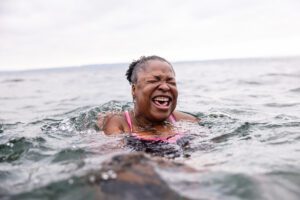
集中智慧:
- 青少年与青春期桑拿和冷水浴对我们的青少年来说可能并不常见,但他们可能有时会在冷水中游泳。
- *生育年龄:避免在排卵期、月经前和月经期间进行冷水浴。在此期间最好进行桑拿浴。
- 生育能力:同样,更侧重于缓解压力,因此要限制或避免冷水浴;如果你喜欢,也许可以多蒸蒸桑拿,但温度要低一些。顺便提一下,男性生育能力的提高更多的是通过冷而不是热来实现的,因为桑拿会对精子质量产生负面影响,而冷浴则有助于睾丸激素的分泌。试图怀孕的夫妇可能需要相反的热疗法--女性需要桑拿;男性需要冷敷。
- 怀孕了如果您已经有热疗法的习惯,并且正在 经历一次不复杂的怀孕在没有压力的情况下,做感觉正确的事情。研究表明,通过高温瑜伽、运动和低温桑拿增加热量对无并发症的妊娠是安全和有益的。如果您以前没有尝试过,也许现在还不是引入它们的最佳时机。如果您很想尝试,请先咨询您的保健医生--慢慢来,避免温度过高,尤其要注意防寒。
- 围绝经期:注意身体是否有任何额外压力的迹象,并注意自己的生理周期(如果有的话)。如果您有任何健康问题,尤其是心脏、肺部或免疫健康问题,请先咨询专业医生。
电磁场与污染

传统人类往往生活在没有污染、很少使用塑料、几乎没有手机信号塔等非本地电磁频率的地区。一些部落已经开始使用手机,因此情况正在迅速发生变化。但是,无论出于何种目的和目的,这些东西迄今为止对他们的生理和健康几乎没有影响。研究表明,空气污染对我们的新陈代谢和荷尔蒙有害。接触化学物质也会改变生理功能,影响我们的荷尔蒙。
关于电磁场的影响,研究结果不一;然而,许多显示无不良影响的研究都是由既得利益者完成的,许多显示相反影响的研究并不常见。在细胞层面上,暴露于电磁场会导致细胞积聚钙质,减少排斥区水分,影响细胞制造能量和保持健康的能力。在怀孕、有小孩或试图怀孕时,谨慎使用手机和笔记本电脑等是明智之举。
众所周知,塑料、香水和其他含化学物质的产品含有双酚 A 和邻苯二甲酸盐等内分泌干扰物质,因此限制使用这些物质也是明智之举。研究表明,我们每周都可能摄入(通过食物、水、空气和皮肤)微塑料和纳米塑料,其数量相当于一张信用卡大小的塑料分子。聚酯、尼龙和丙烯酸服装材料对我们、我们的微生物群和我们的环境都会造成问题,因为它们是以石油为基础的塑料聚合物。
集中智慧:
- 青少年和青春期帮助孩子尽可能避免塑料和其他化学污染。这些东西含有异雌激素,会破坏天然激素信号,与性早熟(早发)有关。
- 生育能力:塑料、香水、家用化学品都含有内分泌干扰物,因此使用天然替代品有助于提高生育能力。
- 怀孕:成长中的胎儿特别容易受到化学、塑料和电磁场污染的影响。不要紧张*但你要尽力限制自己的曝光率,这样宝宝才会得到支持。
- 更年期:另一个接触异雌激素会产生严重问题的女性生命阶段。尽可能加以限制。
- 了解有毒物质的来源以及如何减少接触有毒物质的机会,对各个年龄阶段的人都有好处。这可能是一项既费力又费时的工作,因此也许可以在精力充沛、压力较小的时候解决这些问题。
- *接地和阳光照射可以帮助身体及其细胞更好地应对毒性,饮食(动物蛋白和脂肪)和压力管理技巧也是如此。
压力

我们把最大的因素留到了最后......压力。主要是情绪压力,但身体上的任何压力都是影响荷尔蒙健康的重要因素。在现代生活方式中,我们一直处于压力状态--开车、在不自然的环境中工作、工作压力、经济压力、多任务处理、人际关系问题、不良饮食造成的身体压力等等。我们很少有机会 "减压"。由此产生的没有恢复期的 "战斗或逃跑 "反应的永久状态被称为 "习得性无助"。这表现为荷尔蒙失调、新陈代谢功能紊乱、氧化应激和其他负面的生理变化,以及缺乏改变现状的动力。
许多过着传统生活的狩猎者/采集者在被问及情绪或精神压力时,都会说 "不担心事情"。他们的注意力集中在寻找食物和相互联系上,这通常不会给部落居民带来精神痛苦。至少这些事情不会 觉察到 作为压力。人类,甚至其他动物,被设计成能够在短时间内应对压力环境--逃离威胁或与对手搏斗。这极大地改变了我们的生理机能,但随后我们又会相对迅速地恢复正常。诀窍在于学会把每天发生的事情看作只是发生了而已。这也被称为 "接受"。
在支持健康的压力水平方面,已被证明非常有效的做法是放下对结果的执着,看清现实情况。冥想、正念和呼吸技巧(呼吸法)都是压力管理实践和接受的例子。这些做法还有助于释放催产素和内啡肽等镇静神经递质。
呼吸法对我们的一般生理机能也非常重要--屏气是一种很好的减压方法,它能帮助你保持组织中二氧化碳/氧气的平衡。适当的体育锻炼能起到很好的辅助作用,在大自然中也能起到很好的镇静作用。另一个需要考虑的问题是身体和面部骨骼及软组织结构;紧张点和结构异常会影响您在白天和夜晚的呼吸能力。尤其是当你无法控制忧虑心理、肌肉和关节不适、易怒、磨牙、乏力等症状时,最好去看一下经验丰富的整体身体治疗师。

集中智慧:
- 青少年和青春期:研究表明,每天进行冥想和呼吸练习对青少年大有裨益。通过引导他们这样做,为他们的人生奠定基础。
- 生殖年龄:或许可以从形而上学的层面进行拓展。减压技巧有很多种。尝试二氧化碳/氧气平衡、横膈膜呼吸、正念或冥想,以及瑜伽或气功等减压运动。剧烈运动也有助于缓解情绪压力。找到适合自己的方法。
- 生育:更加注重缓解压力,促进受孕。扩大范围,包括释放生活中的压力。大多数女性表示,她们发现压力小的时候更容易受孕。
- 孕期和哺乳期:只要你有时间和精力,做什么都行--简单的呼吸练习可能是你最好的朋友。
- 更年期:在围绝经期,荷尔蒙会失衡,皮质醇会升高。这些失衡会导致体重增加、荷尔蒙紊乱、心血管和血糖失衡。研究表明,冥想和呼吸法有助于维持健康的皮质醇水平。
如果您对自己的生殖和/或荷尔蒙生活的任何部分有任何担忧,请去看全科医生,或与自然健康专业人士联系,以定制个性化的饮食、生活方式和草药补充剂。
以及女性健康系列的其他内容:
